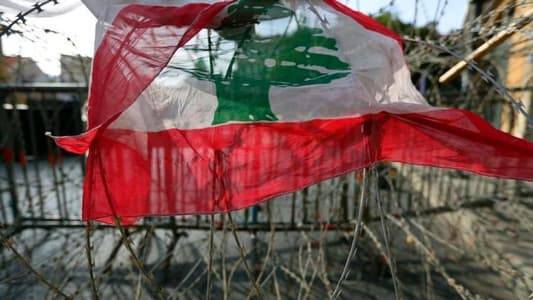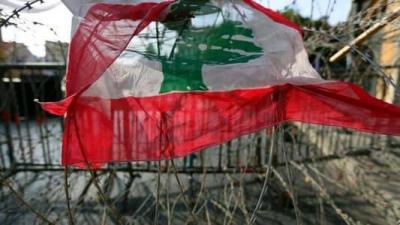A wave of panic has shaken the people of Lebanon, fearing a "virtual" earthquake for which times were scheduled "by the hour." Meanwhile, a polar cold wave has had their bones shivering at temperatures between 4 degrees and -14. Additionally, a new "scorching" wave of black dollar inflation has intensified fears of something worse to come, with the dollar hitting 65,500 Lebanese pounds. This is how Lebanon appeared yesterday, oscillating between two fears: the first being a terror that has gripped its people since the devastating earthquake in Turkey and Syria, reignited by a quake that occurred (on Wednesday evening) on one of the faults above which the "Land of the Cedars" lies, south of Hermel (with a magnitude of 4.2), and fueled by rumors that turned into a terrifying zone wrapping around the country and its people. The second concern is a frightening financial and monetary reality exacerbated by the dollar's continued shake of the last layers separating them from a deadly fall, without cooling the hearts of the Lebanese from the enchanting scenes of the "white general" that covered snow-capped heights. However, the accompanying "ice belt" revived the constant fear for those who have been placed by the financial collapse in the crosshairs of slow death due to hunger and... coldness.
Amid the background of continued political calm regarding internal headlines overshadowed by the burgeoning "networking" of the official Lebanese stance with the Syrian regime through humanitarian and relief support, and what this might entail for reviving the political confrontation surrounding this file, the Lebanese remained yesterday with their eyes glued to the tragedy of Syria and Turkey and the ongoing rescue operations, and their nerves strained after a "memorable" night of unfounded rumors about an "earthquake knocking at the door," which compelled some to leave their homes for the safety of the open air and prompted others to prepare "escape bags" at the first sign of an earthquake.
Official reassurances failed to "hypnotize" the nightmare of a potential seismic event that could occur at any moment, fueled by statements from the Director of the National Center for Geophysics, Marlene Brax, about "unusual activity" with the recording of 11 tremors inside Lebanon in the past two days (not aftershocks), and the necessity of remaining in an alert state for about 48 hours and keeping a bag containing money, passports, valuable possessions, and even medications (for the sick) near the door as a precaution.
Alongside this ongoing concern regarding the situation of Lebanese missing particularly in Turkey, investigations into the implications of the "soft normalization" of the official Lebanon represented by the caretaker government with the Syrian regime have not ceased, as expressed by the visit of the quadripartite ministerial delegation to Damascus and their reception by President Bashar al-Assad, who was informed of Beirut's decision to open all Lebanese air, sea, and land ports for the passage of aid to his country, asserting to the delegation "the importance of cooperation between Lebanon and Syria in all fields based on the mutual interests that unite them."
Informed circles wondered about the reason behind the government's push to cement the Syrian regime as a "political corridor" for humanitarian aid, amid caution from regional and international capitals regarding this and their refusal to make the earthquake a platform for wresting Arab and international legitimacy for President Assad. This comes against the backdrop of repeated affirmations from France that support continues for non-governmental organizations without going through the Damascus government, and Washington emphasizing that the "Caesar" sanctions do not cover humanitarian, medical, food, tent, and other assistance and "do not prevent it from reaching the Syrian people, and we will not prevent any country from providing such aid."
These circles noted a glaring contradiction in the commitment of the "Free Patriotic Movement" to deputize President Najib Mikati with the ministerial delegation's visit to Damascus (which included two ministers affiliated with the movement, one of whom was the foreign minister who led the delegation), while the movement itself refuses to participate in the government's sessions to discuss urgent items on the grounds that it is a resigned government and that it cannot meet amid a presidential vacuum, describing its convening as a "constitutional massacre." This is while it encounters its head in a development as significant as the normalization with the Syrian regime, which is far from "the narrow scope of caretaker work" and "ties" to a distinctly political file with repercussions concerning Lebanon's positioning on the "fault line" of the regional struggle, of which Syria is one of the most prominent links.
It was also noted that the head of the movement, Gebran Bassil, reiterated his call for "countries that imposed a siege to lift it from Syria," as he announced yesterday following the political body of the movement's request that "the international dealings with Syria should change and open the door to serious decisions to lift the siege and injustice, because the issue is no longer targeting a regime but has become a fatal drain on a people," raising questions about whether the "normalization race" is partly related to "misjudgment" and partly to domestic competitive games related to the presidential entitlement, expressed by a "shot" directed at the leader of "the Marada" movement, Sleiman Frangieh, for addressing the earthquake disaster with a "neutral" tweet in which he "offered condolences to the countries and peoples affected by the earthquakes," without any mention of Syria, with which he has a deep and established relationship.
It is worth mentioning that while elements from the army, the Red Cross, the Beirut Fire Brigade, and civil defense continued their mission in the earthquake areas in Syria, Minister of Public Works and Transport Ali Hamiyeh announced that "our priority in raising rubble and saving lives as quickly as required was through sending heavy machinery from the private sector to the earthquake sites." He added in a statement: "Based on the assignment given by the Council of Ministers in its most recent session, and to ensure that the mission procedures formulated and sent to Syria for assistance in search and rescue operations are more effective and supportive, and because the private sector can effectively contribute to mitigating the severity of the disaster due to its possession of heavy equipment crucial in such catastrophes, and based on an accurate definition of the essential needs of the Syrian state, we promptly contacted a number of private companies that own heavy machinery capable of removing debris and reaching the trapped individuals with rubble and saving lives as quickly as possible. After several companies graciously expressed their readiness to respond to the call of duty and humanity, including Mondar, Al Alam Al Arabi, and Houriya, on Wednesday evening, orders were given for massive machinery from them to depart to the Syrian Arab Republic, to participate in executing rescue missions and assisting in debris removal to mitigate the impacts of this humanitarian disaster."
**Russia Provides Lebanon with Free Wheat and Oil Products**
Russian Ambassador to Beirut Alexander Rudakov stated that the Russian leadership has decided to grant Lebanon free supplies of wheat and oil products. Rudakov told Sputnik News Agency, "In response to the call of the Lebanese government, the Russian leadership has decided regarding granting Lebanon free supplies of wheat and oil products, and technical coordination for the transportation of these products is currently underway." He added, "Russia is continually looking for opportunities to support Lebanon amid difficult circumstances, and we are always open to proposals related to launching any mutually beneficial projects."




